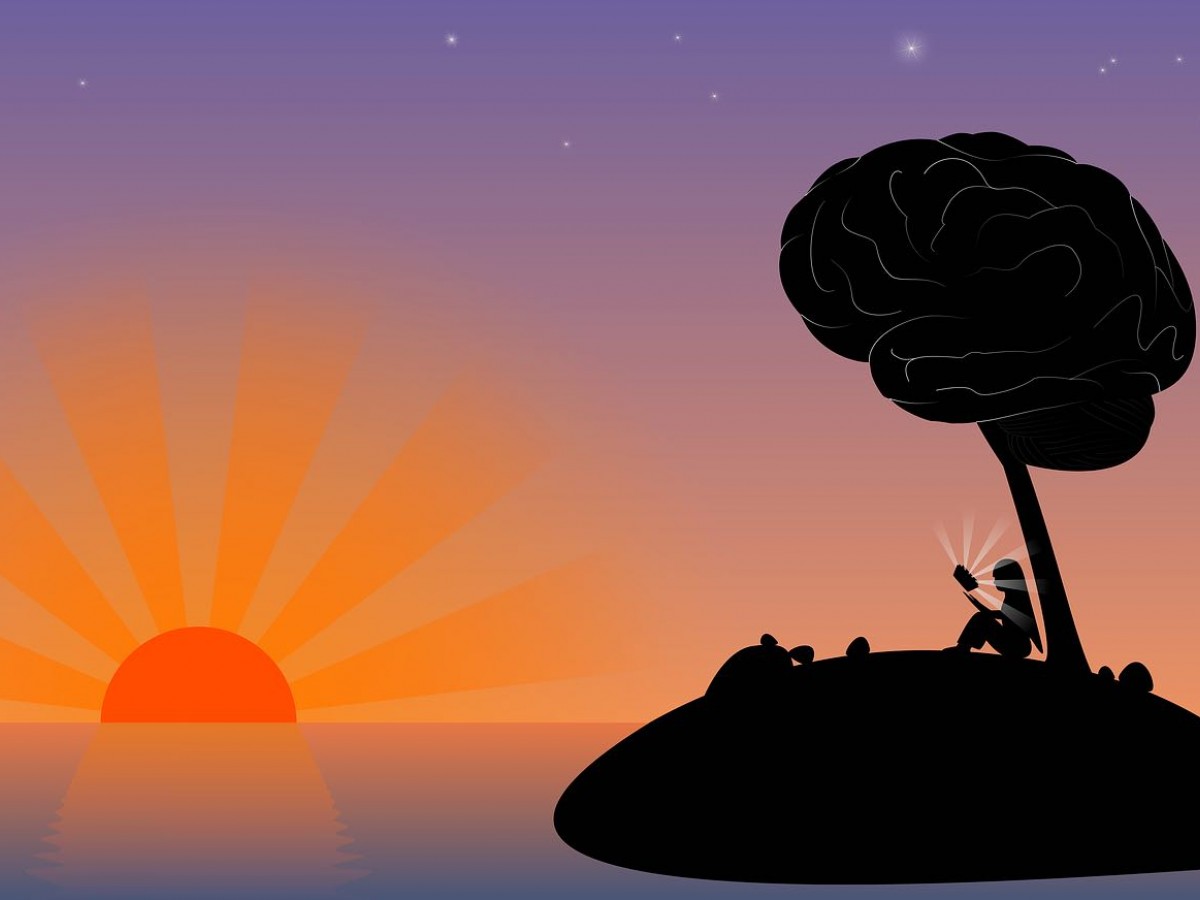What do Lyme disease, mold, fasting, ketosis, and Alzheimer's disease all have in common?
You won't believe the answer...

Awakenings...
Are you even ready for this? Because I almost can't believe we're going there.
Let me introduce you to a new book that has me so excited I can't stop talking about it: The End of Alzheimer’s: The first program to prevent and reverse cognitive decline, by Dale Bredesen, MD.
There's no doubt. Our greatest biomedical failure to date is Alzheimer’s disease—a trillion dollar global problem with no pharmaceutical fix in sight. We all know of cancer survivors, stroke survivors, heart attack survivors, even AIDS survivors...but there are no Alzheimer’s survivors.
Until now.
Dr. Dale Bredesen, internationally recognized expert on the mechanisms of neurodegenerative disease, director of the Program on Aging at the Burnham Institute, and founding President and CEO of the Buck Institute is flipping years of dismal dogma on its head with a revolutionary "programmatics" approach to Alzheimer's disease.
The program is called ReCODE, which stands for Reversing Cognitive Decline and it features 36 mind-altering parameters ranging from homocysteine to insulin to autophagy to mitochondrial function to amyloid to exercise.
This is not a silver bullet. It's silver buckshot.
Why is this a game changer?
Because more than 99 percent of the pivotal drug trials for Alzheimer's disease have failed. FAILED. Kaput. Dead on arrival.
Why?
Because these drugs are designed to target only one of the 36 known contributors to the disease.
Imagine having a roof with 36 holes in it. Now imagine it's raining. Now imagine it's pouring. How much good is it going to do you to plug only one hole?
In other words, for any single drug to work, it would have to do ALL of the following:
- Reduce APPβ-cleavage
- Increase α-cleavage
- Reduce caspase-6 cleavage
- Reduce caspase-3 cleavage
- Prevent amyloid-beta oligomerization
- Increase neprilysin
- Increase IDE (insulin-degrading enzyme)
- Increase microglial clearance of Amyloid-β
- Increase autophagy
- Increase BDNF (brain-derived neurotrophic factor)
- Increase NGF (nerve growth factor)
- Increase netrin-1 and ADNP (activity-dependent neuroprotective protein)
- Increase VIP (vasoactive intestinal peptide)
- Reduce homocysteine
- Increase PP2A (protein phosphatase 2A) activity
- Reduce phospho-tau
- Increase phagocytosis index
- Increase insulin sensitivity
- Enhance leptin sensitivity
- Improve axoplasmic transport
- Enhance mitochondrial function and biogenesis
- Reduce oxidative damage and optimize ROS (reactive oxygen species) production
- Enhance cholinergic neurotransmission
- Increase synaptoblastic signaling
- Reduce synaptoclastic signaling
- Improve LTP (long-term potentiation)
- Optimize estradiol
- Optimize progesterone
- Optimize E2:P (estradiol to progesterone) ratio
- Optimize free T3 and free T4
- Optimize TSH (thyroid-stimulating hormone)
- Optimize pregnenolone
- Optimize testosterone
- Optimize cortisol
- Optimize DHEA (dehydroepiandrosterone)
- Optimize insulin secretion and signaling
As you can imagine, this is simply outside the scope of what a drug can do, what any drug can do.
This should come as no surprise. Complex diseases are like this. They are not reducible to tit-for-tat, this-for-that, pill-for-every-ill solutions. Instead, they require programmatic solutions, or biologically networked solutions—like the brain itself.
Welcome to ReCODE.
The nuts and bolts of ReCODE.
ReCODE is the first program to successfully reverse cognitive decline in hundreds of patients with sustained results.
The program is multimodal. It starts with getting a “Cognoscopy", which is an individualized 360-degree look at all the factors a person can address to start healing the brain: blood values, cognitive assessments, gene assessments, diet, lifestyle, and environmental assessments.
Silver buckshot indeed. Or if you prefer: Occam's network rather than Occam's razor. Because you can't make things simpler than they actually are.
In retrospect, it's easy to see how medical science misunderstood Alzheimer's. It was looking for the "one thing” that causes Alzheimer's, instead of the 36+ things that cause it. And when you fixate on "one thing", you can easily start chasing your tail and even mistake the effect for the cause, i.e. Amyloid-β.
This is exactly Bredesen's bombshell: Amyloid doesn’t “cause” Alzheimer's disease. Amyloid is the "effect" of Alzheimer's disease (as well as its accelerant).
Fffffffffft. That's the sound of all the air going out of the Amyloid hypothesis.
Apparently, the brain produces Amyloid as a protective response to 3 other fundamental insults to the brain:
- Inflammation
- The absence of supportive factors
- Toxic exposure
Accordingly, there are 3 subtypes of Alzheimer's that arise from these insults:
- "Hot" or inflammatory Alzheimer's disease caused by stealth microbes or inflamed metabolism.
- "Cold" or atrophic Alzheimer's disease caused by suboptimal vitamins, hormones, and trophic factors.
- "Toxic" Alzheimer's disease caused by toxins like mercury or mycotoxins (mold)—often combined with a failure of glymphatic detoxification due to disrupted sleep architecture, or genetically poor clearance of toxins.
ALL of these insults result in the formation of Amyloid as a protective measure. The final common pathway is then what we call "Alzheimer's disease".
The brain, it seems, has a finite number of responses to an infinite number of insults.
How to give yourself Alzheimer's.
In order to see the path forward to wellness, it is helpful to see the path backward to illness. This is the whole study of pathology. And it's why Dr. Bredesen includes a chapter called "How to Give Yourself Alzheimer's".
In a nutshell, here’s how to give yourself Alzheimer's according to Bredesen:
- Live with undiagnosed/untreated sleep apnea, or just stay up late every night and burn the candle at both ends.
- Eat foods with added sugar every day
- Eat trans fat or partially hydrogenated vegetable oils
- Suppress stomach acid and impair your uptake of key brain nutrients like zinc, magnesium, and vitamin B12.
- Remain ignorant of your ApoE gene status because you've been told there's nothing you can do about it.
- Have lots of stress with NO stress-management strategy.
- Eat lots of gut disruptors like lectins, gluten, NSAIDs, Tylenol, antibiotics, pesticides, herbicides, processed foods, etc.
- Ignore the moldy smell in your home, car, or workplace.
- Ignore stealth microbes, like P. gingivalis in your gums or Lyme disease in your body, that stir up chronic inflammation and burn your neural house down.
- Consume lots of mercury-rich fish like Tuna, Swordfish, Shark, and Orange Roughy.
- Deplete your nutritional status, hormones, and trophic factors with the Standard American Diet (SAD) or the Standard American Stress Response ("always on").
- Fail to give yourself enough metabolic rest each day for cellular repair by not fasting 12-16 hours between dinner and breakfast.
- Settle for vitamin D levels that are nearly 2 standard deviations below optimal because they are "within normal limits". Ditto for dozens of other lab parameters.
- Don't move. Settle for sitting as the new smoking.
- Pressurize all your relationships with expectations until you don't enjoy them anymore.
- Pressurize your life with expectations until you don't enjoy it anymore.
Obviously there's not a one-to-one relationship between any of these bullet points and Alzheimer's disease. It's a stack effect. But it's an eerily familiar stack. It's the stack of modern life.
ReCODE is nothing more or less than the reversal of this stack. The anti-stack, if you will. The good stack. The stack that asks, "What if I did the opposite?"
As a research scientist, if you would have told me 15 years ago that I would be telling people to change their diet [and lifestyle] instead of telling them to take a new drug we developed, I would have laughed…but I can’t ignore the data. —Dale Bredesen, MD.
As a nutritional therapist, I am particularly interested in Dr. Bredesen’s basic dietary recommendations:
- Eat mostly vegetables and healthy fats.
- Eat only modest amounts of protein (or “condimeats”).
- Combine items 1 & 2 with circadian rhythm fasting (intermittent fasting).
How's that for simple? It's an approach that is gratifyingly similar to my own strategy for healing...My Fabulous 5:
- Fat
- Fiber
- Fitness
- Fasting
- Phytonutrients.
Bringing it all home.
I once looked into this abyss. And once was enough.
My own brush with cognitive decline in the wake of Lyme disease and mold toxicity was terrifying. I found myself not wanting live anymore at one point, it was so bad. So I can imagine all too well the pain of Alzheimer's, not just the pain of the victim as he or she descends into fitful oblivion, but the pain of the onlookers, the pain of the loved ones—the pain of the long goodbye.
But now there is hope:
With what we know now, we can make Alzheimer’s disease a rare disease. —Dale Bredesen, MD
This is very big news, very big buckshot—or very big BS—depending on your cognitive bias.
Could this really be the end of Alzheimer's, the end of the long goodbye? Now is your chance to find out for yourself.
Check it out:
- Book: The End of Alzheimer’s
- Interview: Predicting the End of Alzheimer's
- Peer-Reviewed Research: Comprehensive list on PubMed
- Bredesen's Website: Apollo Health
Special thanks to reader J. Wilson, MD for putting this book on my radar.
Photo by Lotte Meijer on Unsplash
